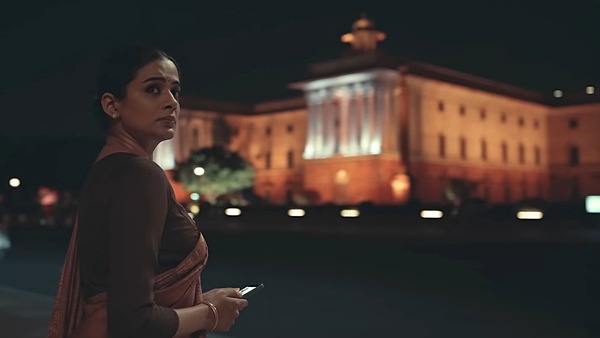Article 370: Yami Gautam Packs A Punch In This Paean To India’s Ruling Party
Directed by Aditya Jhambale, Article 370 wears its political agenda on its sleeve, and if anything, props to the makers for not shying away from taking a strong stand (propaganda notwithstanding).

Last Updated: 10.03 PM, Feb 23, 2024
THAT A FILM titled Article 370, produced by the team that made Uri: The Surgical Strike and vetted by the Prime Minister himself, begins with multiple jabs against Jawahar Lal Nehru should not come as a surprise. With a heavy voiceover by Ajay Devgn, who gives us a brief history lesson about the conflict in Jammu and Kashmir, the film begins.
Directed by Aditya Suhas Jhambale, the film wears its political agenda on its sleeve, and if anything, props to the makers for not shying away from taking a strong stand (propaganda notwithstanding). Clarity of content is a laudable quality in the film industry, and Article 370 makes no bones about what its stand is on the Abrogation of Article 370, which gave Jammu and Kashmir special status. The film is a stylised, skillfully shot and edited puff piece on how Abrogation has solved all the issues that Jammu and Kashmir has been battling since 1947.
If you’re thinking of logical, relevant questions — like, how is a 2-hour 40-minute film going to present an objective, holistic view of a socio-geo-political conflict like the one in J&K? When a complex political affair is presented like an Argo-esque, edge-of-your-seat thriller, does it distil the challenges that the country saw when the real life issue was playing out? — don’t. There’s barely any point. Aditya Dhar and team don’t want you to draw too many parallels with reality. The film begins with a disclaimer that the events are dramatised and fictionalised, as if to say, don’t be so critical, don’t think so much, enjoy yourself and be a part of this grand, cinematic paean to the current Indian government. And it doesn’t help that the production value and technicality of the film is top-notch.

Article 370 is divided into six chapters, and shepherding the narrative are two powerful women: field officer Zooni Haqsar (Yami Gautam Dhar), and Rajeshwari Swaminathan (a stoic Priyamani) who is the Joint Secretary — PMO. This could be a strategic casting move, to field the backlash that may occur post release. Dhar had said in a recent interview that Uri: The Surgical Strike is a “war drama” while Article 370 is a “political drama” with the “right” intent. And yet, the narrative that is presented seems one-sided, with no acknowledgment of the struggles of cutting off communication in the Valley in the run-up to (and well after) the Abrogation, a mocking of the human rights discourse, and most of all, the metaphorical use of the famous (nationalistic) adage in the climax of the film, “doodh maango kheer denge, Kashmir maango cheer denge.” Nothing about Article 370 is unbiased, and it should not promise to “tell the truth” about… anything.
More about the story: Zooni is tasked with hunting down and killing a militant — Burhan Wani — but finds bureaucratic hurdles in the form of her own boss, who could be linked to the ISI. Zooni goes ahead and kills Wani, but this fuels the separatist issue in the Valley and sparks off unrest among locals. No matter the parallels with real life, in the film it is Rajeshwari who proposes that the only answer to this decades-long political struggle is the removal of J&K’s special status so that local leaders stop politicising and taking advantage of it. She sets up a special team that looks into the logistics, legality and operations aspect of it before taking her case to the Prime Minister (Arun Govil plays Modi here) and Home Minister (Kiran Karmarkar, who plays Amit Shah).
What follows is a melodramatic, on-the-nose patriotic (thankfully there’s no place for jingoism in this film), and stylised sequence of events that aims to establish how the ruling party put national pride above petty state politics to solve one of the biggest complexities of modern India. This is corroborated with a caricaturish representation of state ministers like Mehbooba Mufti (played by Divya Seth) and Omar Abdullah (played by a hammy Raj Zutshi), and a celebratory end credits scene which shows that the crime rate, terrorism and overall unrest has drastically reduced since the 2019 passing of the J&K Reorganisation Act, while making way for tourism and business prospects.
Now, some positives. Seeing two women take the burden of this story moving forward is very refreshing to see for an action thriller. Yami’s character is written like the true alpha hero of this story, while Priyamani gets to play the proud brains of the operation, and has a victorious smirk at the conclusion — one that is usually reserved for the older, wiser actors who populate these kinds of roles. The narrative unfolds in a fast-paced manner that doesn’t really allow room for analysis (which is deliberate), and both the interval block (which portrays the Pulwama attack) and the climax are engaging and thrilling in equal measure.
If I had to sum up this review in one line, it would be this: Leave your brain at home, the way the makers want you to, and enjoy yourself in a way that what movie you’re really watching doesn’t matter. This way, you get the big screen experience that you left your home for. And ultimately, it’s your footfall that matters here, not your critical thought.
The views expressed in this column are those of the author and do not necessarily reflect the official policy or position of OTTplay. The author is solely responsible for any claims arising out of the content of this column.

 Premium
Premium